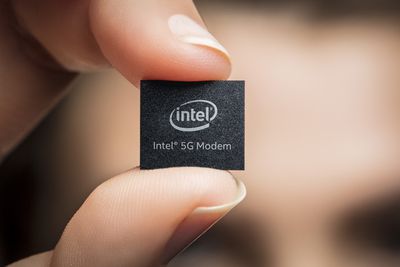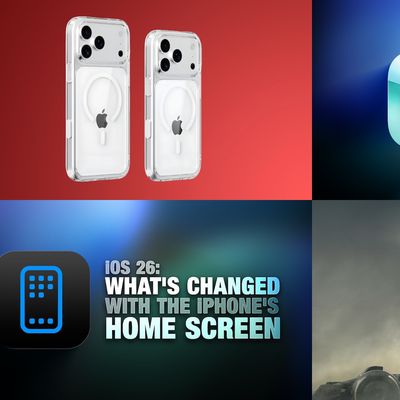Apple Considered Purchasing Intel's Smartphone Modem Chip Business
Apple had discussions with Intel about potentially acquiring parts of Intel's smartphone modem chip business, reports The Wall Street Journal. Apple was interested in Intel's technology to speed up its own efforts to build modem chips for smartphones.
Intel and Apple entered into discussions last summer and the talks continued for months, but ended right around the time Apple settled its legal dispute and reached a supply agreement with Qualcomm.

Sources at Intel that spoke to The Wall Street Journal said that Intel is exploring "strategic alternatives" for its smartphone modem chip business, and is still interested in a sale to Apple or another company.
In an interview yesterday, Intel CEO Bob Swan confirmed that Intel is considering alternatives "based on what's best" for Intel's IP and employees.
Selling the modem business would allow Intel to unload a costly operation that was losing about $1 billion annually, according to another person familiar with its performance. Any sale would likely include staff, a portfolio of patents and modem designs related to multiple generations of wireless technology, said Patrick Moorhead, principal at Moor Insights & Strategy, a technology firm.
Intel announced earlier this month that it was exiting the 5G smartphone business, just hours after Apple and Qualcomm announced a resolution to their legal troubles and a new supply deal.
Apple had been planning to use Intel's 5G chips in its 2020 iPhones, but rumors suggested Intel was having trouble meeting design deadlines and that the relationship between Apple and Intel was souring. Just yesterday, Swan also confirmed that Apple's deal with Qualcomm was the reason why Intel decided to stop making 5G chips.
Apple is now planning to use Qualcomm's 5G modem chips in its 2020 5G iPhones. Intel has said that it is going to continue to supply 4G LTE chips to meet already established orders, which means that Apple's 2019 iPhone lineup will likely continue to use Intel chips rather than Qualcomm chips. It is too late in the design cycle for Apple to swap chips for this year's upcoming devices.
Popular Stories
A new Apple TV is expected to be released later this year, and a handful of new features and changes have been rumored for the device.
Below, we recap what to expect from the next Apple TV, according to rumors.
Rumors
Faster Wi-Fi Support
The next Apple TV will be equipped with Apple's own combined Wi-Fi and Bluetooth chip, according to Bloomberg's Mark Gurman. He said the chip supports ...
Apple will launch its new iPhone 17 series in two months, and the iPhone 17 Pro models are expected to get a new design for the rear casing and the camera area. But more significant changes to the lineup are not expected until next year, when the iPhone 18 models arrive.
If you're thinking of trading in your iPhone for this year's latest, consider the following features rumored to be coming...
Apple's next-generation iPhone 17 Pro and iPhone 17 Pro Max are only two months away, and there are plenty of rumors about the devices.
Below, we recap key changes rumored for the iPhone 17 Pro models.
Latest Rumors
These rumors surfaced in June and July:A redesigned Dynamic Island: It has been rumored that all iPhone 17 models will have a redesigned Dynamic Island interface — it might ...
The long wait for an Apple Watch Ultra 3 is nearly over, and a handful of new features and changes have been rumored for the device.
Below, we recap what to expect from the Apple Watch Ultra 3:Satellite connectivity for sending and receiving text messages when Wi-Fi and cellular coverage is unavailable
5G support, up from LTE on the Apple Watch Ultra 2
Likely a wide-angle OLED display that ...
iPhone 17 Pro and iPhone 17 Pro Max models with displays made by BOE will be sold exclusively in China, according to a new report.
Last week, it emerged that Chinese display manufacturer BOE was aggressively ramping up its OLED production capacity for future iPhone models as part of a plan to recapture a major role in Apple's supply chain.
Now, tech news aggregator Jukan Choi reports...
The iOS 26 public beta release is quickly approaching, while developers have recently gotten their hands on a third round of betas that has seen Apple continue to tweak features, design, and functionality.
We're also continuing to hear rumors about the iPhone 17 lineup that is now just about right around the corner, while Apple's latest big-budget film appears to be taking off, so read on...




















